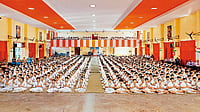Nipah in 2018, coronavirus or COVID-19 now—Kerala has been setting an example of containing modern-day epidemics. As the state braces for a coronavirus-free status (two of its three positive cases have turned negative following quarantine/treatment), health minister K.K. Shailaja tells Preetha Nair that Kerala’s robust public health system helps contain disease outbreaks. Excerpts:
Two of the three medical students who tested positive have been discharged from hospitals. When can we expect the state to be declared coronavirus-free?
The two cases from Kasaragod and Alappuzha districts have been declared negative on repeat tests. The student from Thrissur, who was the first patient in India, is still in hospital. In her case, our tests showed negative, but we are waiting for the Pune-based National Institute of Virology’s report. We can declare the state COVID-free after the quarantine period is over. We will have to wait till March first week. I can say there is no further spread of the virus. Latest reports say more than 2,000 people are under observation.
Were lessons learnt from the two Nipah outbreaks useful?
In case of Nipah, we figured out the disease after three or four deaths. The experience immensely helped us face any health emergency. Training of health officials and strengthening of surveillance has worked. We are prepared to set up isolation wards and control rooms to monitor any situation. Our biggest strength is that Kerala has a robust public health system.
How did you react when the first coronavirus case in the country was reported in Kerala?
We began preparatory measures when cases were reported from Wuhan (China) in January; Kerala has many medical students there. Anticipating emergency cases, we set up a 20-member rapid response team and control rooms. Apart from screening at airports, we also deployed volunteers. The department sent alerts asking people returning from China (there were 82 in the first batch) to contact us. When the first student with symptoms arrived, the health department decided to keep her and her family in isolation. On Day One, we informed district hospitals and medical colleges to set up isolation wards. Two more students, who tested positive, were also isolated and samples were sent to Pune. Guidelines were sent to all districts; strict protocol was followed for handling and sending samples. Since no cure is available, we are treating patients with supportive medicines.


























